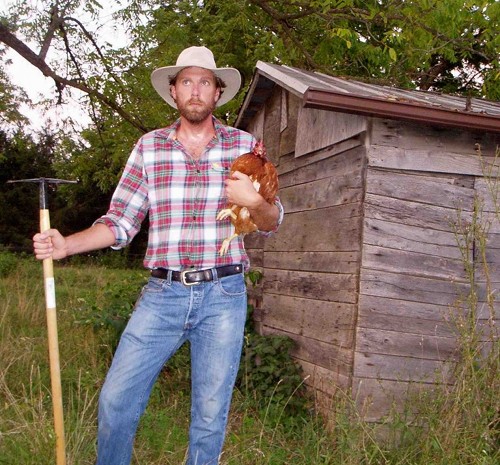
Editor’s Note: This is a guest post from Forrest Pritchard, farmer and author of Gaining Ground.
You’ve dreamed of becoming a farmer, growing food not just for yourself but for your greater community. You yearn to work with the soil, and are prepared for a life of physical toil, intellectual challenges, and uncertain finances. All that’s left is to trade in your suit and tie for sturdy boots and a dilapidated hat.
Congratulations. The world needs you. According to this article in The Atlantic, there are currently more bus drivers than farmers in the United States. While at first glance this might seem like an arbitrary statistic, consider this: which is more likely to happen first, a bus driver needing to eat, or a farmer needing a bus ticket? Food ranks in the upper echelon of human needs, right beside oxygen, sleep, and cuddling with your sweetheart.
The planet needs nutritious food, and that requires thoughtful, intelligent people to grow it. So if you’re genuinely considering farming as a career, tape the following 9 rules for starting a farm to your refrigerator, tack them to your barn door, or commit them to memory. After fifteen years of running my own farm, these lessons were hard won, but continue to serve me well. As you pursue your own farming dream, keep them in the forefront of your mind. Following them might not guarantee success, but they will certainly put you on the path to economic and agricultural sustainability.
9 Rules for Starting Your Own Farm
Rule #1: Avoid Debt!

Farming doesn’t HAVE to be financed with borrowed money. Avoiding debt should be a primary goal for any new farmer, even if they have to start very, very small for a few years. That’s how our farm started. And clearly, I still save my pennies.
Why is this #1? Why does it have an exclamation point after it? Because—listen up—in the past fifty years, debt has tanked more farms than drought, plague, and pestilence combined. If there’s one thing our national housing crisis has reinforced, it’s how economically debilitating debt can be for the average person. Farmers aren’t immune to these challenges. Legions of great producers have abandoned their farming dreams simply because they couldn’t pay their debt when the bank came calling.
In a nutshell, debt (borrowing money, with interest) allows us to accelerate our goals, turning dreams of tomorrow into realities of today. While borrowed money might buy us a tractor, a new barn, or even the land we’ll be farming, experience, the most valuable farming asset of all, cannot be purchased.
Experience doesn’t come with a Bachelor’s Degree in Agriculture, and it certainly doesn’t come from a book. Agriculture is fraught with uncertainties, surprises, and intellectual challenges. And that’s just before lunch. Adding monthly payments to this intimidating list financially handcuffs most people right from the start.
So does this mean ‘never take on debt’? Certainly not. There are plenty of times when leveraging assets makes sense. As you gain farming experience, and create reliable cash flow in your business, these opportunities (or necessities) will become clearer. In the meantime, however, embrace this generalization: avoid debt as much as possible.
Rule #2: Allow Yourself the Opportunity to Fail
Wait a minute. This was supposed to be about not failing, and now we’re saying failure’s an opportunity? Ironic, I know. Bear with me.
Our culture seems obsessed with failure, simultaneously terrified and captivated with the concept. I know people who spend their days avoiding the humiliation of failure at all costs. Some of these people fear failure so much, they never try to accomplish anything. The thought of failure paralyzes them.
If failure is a major concern to you, here’s a spoiler: in farming, you will fail. 100% chance. In fact, with apologies to Benjamin Franklin, failure on a farm is every bit as reliable as death, taxes, and Paul Schaffer calling a rimshot.
But here’s what no one ever told me. It’s okay to fail. Moreover, in farming, it’s important to fail. While painful at first, failure can be an enormously useful tool. It helps us learn our personal limits of time and energy. It’s an instrumental timesaver in the long run, letting us know what works well, and what’s a complete boondoggle. Failure provides us perspective for future enterprises, making us intellectually stronger, more emotionally resilient.
So, thumb your nose at that sagging bookshelf loaded with self-help books telling you you’re not a failure. Yes you are! Get out there and fail! But while you’re failing, fail well. Fail gracefully and thoughtfully. It’s the only sure way to recognize success when it finally arrives.
Rule #3: Identify Your Market Before You Start Farming
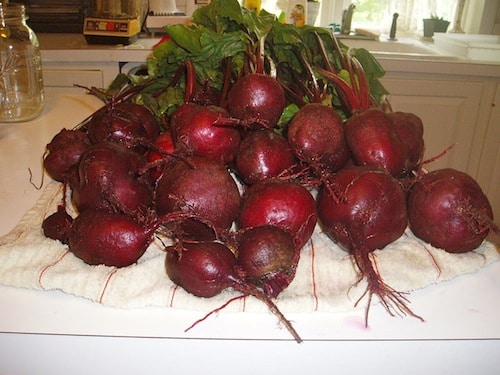
Beautiful, but these beets (and many more) were all ready to be picked at the same time. These were shared with my family, but would have also found happy homes at my local farmers market.
So you want to raise cattle, grow watermelons, or start a sauerkraut business. Maybe you just want to sell wool to local knitters. Awesome. I like steaks, sauerkraut, and knit caps as much as the next guy. But how are you going to find customers like me? Do I live in your neighborhood, or five hundred miles away? How much of your stuff will I buy? How will you find others like me? What will you do if I buy ALL of your stuff, and you’re sold out? What will you do if I buy NONE of your stuff, and you’ve got a barn full of it?
Before you plant that first seed, jar your first kraut, or shear your first ewe, take the time (lots and lots of time) to figure out where you’re going to sell your products, who is going to buy them, and how you’re going to do it. Once you’ve done this, create a backup plan. Then, come up with another backup plan. Chances are you’re going to need them.
Small and niche producers spend an enormous amount of effort finding their customers. This is every bit as important as growing the food to begin with, because without appropriate sales channels, fresh produce will quickly languish. When all those watermelons ripen at the exact same moment, you’ll need a place to sell them—and fast. Have a solid marketing plan prepared well in advance.
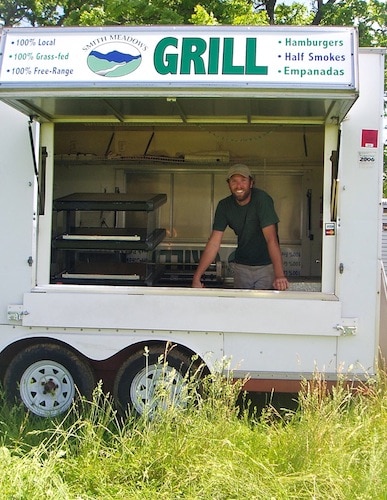
Rule #4: Match the Land to Its Suited Use

We try to take our cues from nature. In the Mid-Atlantic, grazing, foraging and gleaning opportunities present themselves nearly year-round.
We can try to force our human dreams onto the land, or we can work with what nature gives us. On our farm, wild turkeys, deer, cottontail rabbits, and raccoons naturally flourish. As such, it’s no coincidence that we’re able to raise free-range chickens, sheep, cattle, and pigs on our land. While the correlations may not be identical, when we stand back for a moment and consider the landscape, there’s a nice pattern here.
Conversely, a few years back, we tried raising free-range ducks. We learned the hard way how they evinced their waterfowl instincts: In a matter of weeks, they turned acres of pasture into muddy ponds. They methodically tipped over their automatic watering troughs (it’s a long story, but trust me, they did it), creating sloppy watering holes in our pastures that we dubbed ‘quack mires.’ In their own way, ducks were telling us that they belonged near water, not out on pasture. We listened. The following season, we stopped raising ducks and have been happier ever since.
Rule #5: Grow Your Passion
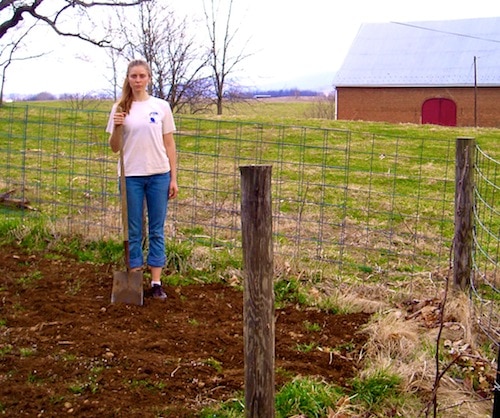
Shovel, dirt, gumption. Check, check, and double check. What comes next?
Everyone knows that farming is hard work. So do yourself a favor: grow something that you love. Like blueberries? Then grow blueberries, for Pete’s sake. If you grow what you’re passionate about, it will help mitigate those difficult days when the sledding gets rough and things don’t go your way. It may seem like common sense, but we often find our decisions driven more by finances, tradition, or inertia than by something we truly love. Go out on a limb, and grow heirloom apples if you want. Consider it your first reward. There will be more.
Rule #6: Set Reasonable Goals
Yes, yes, we all know that you were a double major, the captain of the fencing team, and turned down a Fulbright to construct Mongolian yurts in the Peace Corps. You’re talented, we get it. Now repeat after me:
“It’s okay if I can’t feed the entire state of Nebraska, so long as I can supply my local market.
It’s okay if I don’t make ‘X’ number of dollars this year, as long as all of my bills are paid.
It’s okay if I don’t add an additional enterprise, until I get really good at the 3 other enterprises I’m already trying to master.â€
Yes, you workaholics, it’s even okay to take Tuesday afternoons off to drink a few beers and read a book, especially if you work all weekend (like I do). Take care of yourself. Burnout is big in farming. You already know that the work is physically taxing, with unique emotional demands. Find your pace. Visualize a fifty-year career, and set annual, reasonable goals that will get you there. Check in with yourself frequently. And by all means, if you raise flowers for a living, be sure to “stop and smell the petunias†from time to time. Or the daffodils. Whatever…I raise pigs, cut me some slack.
Rule #7: Don’t Worry About What Other People Think
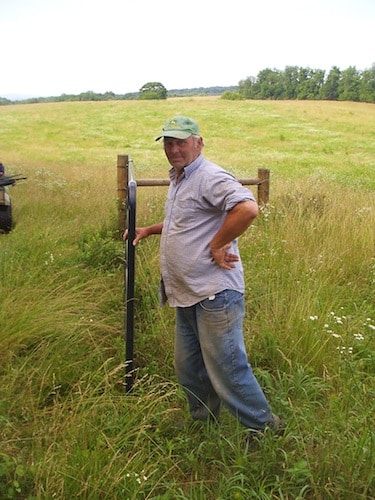
There’s an old man open gate, and stand in the field area.
In 1994, when I was twenty years old, I found myself talking to an older farming couple at a local picnic. We both raised cattle for a living, but they sold their animals straight to corn-fed feedlots. They asked me about my farming ambitions, and I told them of my dream to sell 100% grass-fed beef. The cattle would be completely organic, and I’d direct market the meat myself. I told them our farm could provide food for several hundred families once I really got going.
Their reaction? When I had finished speaking, they turned to each other, made eye contact, and burst into uncontrollable laughter.
Eighteen years later, despite this withering response from my elders (they apologized for their behavior after they managed to stop laughing, bless their hearts), our farm has accomplished all of these goals and much, much more. If I had worried what my neighboring farmers thought of me, I certainly wouldn’t be sitting here now, typing this list. Believe in yourself, and just go for it.
As for that couple? Five years ago, they put a sign up at the end of their lane: “Free-Range Beef for Sale.†The sign is out there at this very moment. Pardon me while I indulge in a moment of uncontrollable laughter.
Rule #8: Have a Sense of Humor
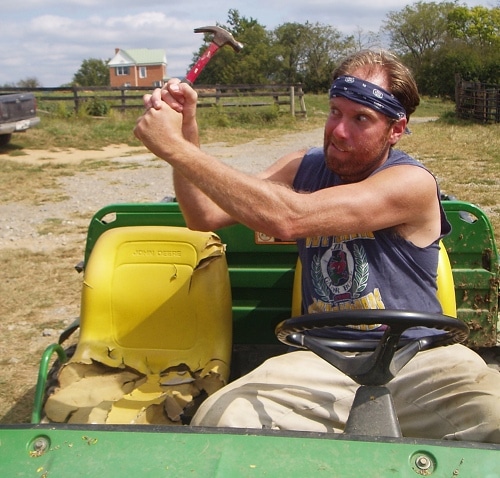
Lighten up Francis: When it comes to farming, it’s only a matter of life or death.
Think about it for a second. Take an average day at a mainstream job. What’s the worst that typically happens? A client gets pissed off, or an irate customer reams out the supervisor. Maybe Larry (whatever happened to guys named Larry, anyway?) gets his tie caught in the fax machine…again. Somebody get that guy a golf shirt!
On any given day on a farm, things die. And not in any noble, dignified, or discreet kind of way, either. Things die screaming, eviscerated, and—more often than we’d care to think about—partially masticated. Have you ever walked through the morning dew to check on your free-range chickens (cue love theme from St. Elmo’s Fire), crested a hill, and found them slaughtered willy-nilly (cue Insane Clown Posse’s “Night of the Chainsaw“), their gleaming entrails spilled across the clover?
Frankly, it puts this whole farming thing in perspective pretty quickly. And faced with the possibility of daily mayhem, a sense of humor can be a handy-dandy coping mechanism.
I learned this particular bit of wisdom from Travis, a farmhand of over 50 years. Travis arrives on my farm each morning sporting an un-ironic trucker’s hat, unruly lamb chop sideburns, and an emotional disconnect that leaves no doubt he’s capable of neck-punching me into a coma. After pulling a mummified calf from a laboring heifer one afternoon, he regarded me with pale, unblinking eyes.
“You know,†he said, “if we didn’t laugh about things, we’d probably end up just murdering each other.â€
Right you are, Travis. Right you are.
Rule #9: Read. Ask Questions. Share Your Knowledge.
Okay, so this is really numbers nine, ten, and eleven all rolled into one. Consider it a farming Venn diagram.
Don’t like to read? Start. Read everything that hits your intellectual radar.
Shy? Get up near the teacher if you want to learn anything.
Have an ego? Better to lose it now, before Mother Nature loses it for you.
Last but not least (bonus rule!): Be generous with your knowledge, especially with people who want to learn from you.
So that’s the list. Still want to be a farmer? Congratulations again! You’re entering a world of excellent company. As Bob Evans (yes, that Bob Evans) once told me, there’s no finer group of people on the planet than those who call themselves farmers. By all means, join us.
Be sure to also listen to my podcast with Forrest:
__________
Forrest Pritchard is a farmer at Smith Meadows, a seven-generation family farm located in the rolling hills of Virginia. He’s the author of the recently published book, Gaining Ground, a memoir about how he saved his family farm with sustainable farming. Look for our podcast with Forrest later this week!


